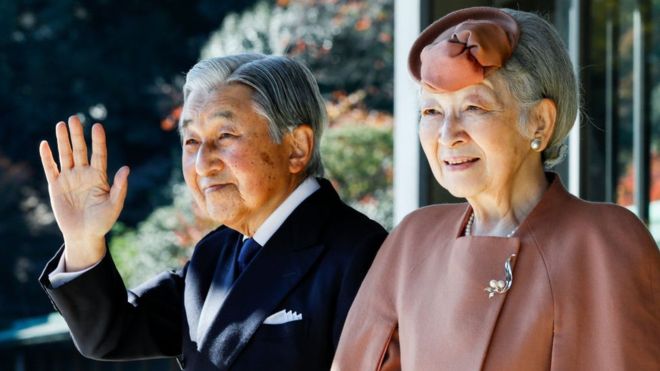Akihito is the 125th member of the world’s oldest reigning dynasty. Akihito, original name Tsugu Akihito, became emperor of Japan in 1989 upon the death of his father, emperor Showa (Hirohito). He was the fifth child and eldest son of Emperor Hirohito and Empress Nagako. And during his early years, he was reared in the traditional imperial manner. But it wasn’t long before he began breaking Japanese tradition. And during his time, he managed to break many of the traditions set in the history books.
According to the Constitution of Law, the emperor in Japan is “the symbol of the state and of the unity of the people”. His function is defined as entirely representative and ceremonial in nature. He doesn’t have even a nominal role in government. But despite limited to acting in matter of state as delineated in the Constitution, Akihito has managed to leave his mark in Japan.
The Wedding that broke centuries of tradition
Akihito came of age in 1952, and he was invested as heir to the Japanese throne. It took him just a couple of years to start leaving a mark. Seven years later, he broke more than 2,600 years of tradition. As a crown prince, he married a commoner, a non-royal bride. It was a first in Japan.
Akihito married Shoda Michiko, a daughter of a wealthy businessman. The wedding was broadcast live on television and marked a turning point in Japanese society. Millions watched at home, and hundreds of thousands lined the streets of Tokyo on the wedding day.
Another wedding tradition broken
In 2005, Akihito broke another wedding tradition when he announced that he will attend the wedding of his daughter. Both he and the Empress Michiko attended the wedding. It was unusual, and broke the centuries-long tradition of the monarch ignoring the wedding of a female member of the family.
The Princess Sayako, same as her father, married a commoner, a four years older than her urban planner. The couple wed in a Shinto-style ceremony at the Imperial Hotel in Tokyo.
Under the customs of the royal line of Japan, the daughter of an emperor becomes a commoner upon her marriage.
Akihito and Michiko have also broken the tradition by raising their children on their own.
Death Wish
When the emperor Akihito eventually dies, he will break another old tradition. The Emperor announced his wish to be cremated upon death, and that his mausoleum will be significantly smaller than those of his predecessors. Cremation was used as a burial method in Japan until Emperor Gokomyo was inerred in 1654. For more than 350 years, the burial of the Emperor was a huge event in Japan.
But Akihito and Michiko want their funeral to reflect their wish to minimize the impact of the funeral rites on people’s lives. One of the biggest achievements of Akihito was to bring the royal family closer to the people.
Public appearance
As mentioned, Emperor Akihito and Empress Michiko made a goal to bring the family closer to the common people. In response to the 2011 Tohoku earthquake and tsunami, the Emperor made a historic televised appearance. He urged his people not to give up hope and to help each other. He also made a visit on Wednesday, March 30, to a temporary shelter housing refugees of the disaster, in order to inspire hope in the people.
Leaving the throne
The Japanese government announced that Emperor Akihito will abdicate on April 30, 2019, and that his son, Crown Prince Naruhito, will ascend the throne the following day.
While imperial abdications are not uncommon in Japanese history, Akihito will be the first Japanese emperor to abdicate since 1817.
He made his desire known on August 8, 2016. In his televised address, he hinted at the desire. At 82 years of age, he discussed his declining fitness, and stating that it has become a difficulty to carry out his duties as the head of state.
Japanese lawmakers had to alter the Imperial Household Law of 1847, which specifies the line of imperial succession. The law did not include a process for abdication or outline who would succeed Akihito. It was not until June 2017, that lawmakers enacted a special law that would allow him to abdicate. The Emperor formalized his intentions on December 1, 2017.





















